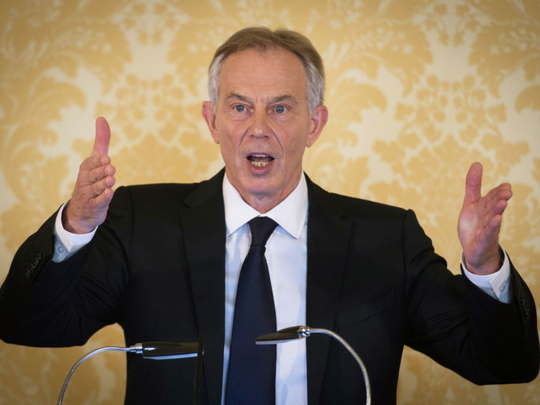
All knives may be pointing at former British prime minister Tony Blair for dragging Britain into an unnecessary war with catastrophic consequences, but he was by no means its mastermind — and neither was the UK the chief protagonist.
The recently-released Iraq War Report was damning in just about every respect except for its finding that the former prime minister’s decision to hitch his wagon to former US president George W. Bush and his band of neoconservatives, in spite of his own reservations, was made in “good faith”.
It is clear from Blair’s declassified memos and notes transmitted to Bush that his faith in the ‘Special Relationship’ transcended all other considerations. He was in, come what may, even if that meant exaggerating intelligence, using propaganda tsars and riding roughshod over cabinet advisers to lure parliament and the country on board. He enjoyed his comfy spot on Bush’s lap and now this pooch is forced to bark his innocence while the US caravan moves on.
Britons were up in arms over the decision to go to war from the start, and still are. Why aren’t Americans clamouring for their own unvarnished Iraq War inquiry? They were cynically duped too, robbed of thousands of their finest, their country’s budget surplus depleted.
They were told that Saddam Hussain had stockpiles of weapons of mass destruction (WMDs) and the intention to use them, as well as the blatant lie that he had links with Al Qaida, which was told to reignite September 11 sentiments. When US ambassador Joe Wilson debunked their claims that Iraq had been purchasing uranium from Niger, his wife was exposed by a media lackey as being a CIA agent.
Poor old former US secretary of state Colin Powell, at one time tipped for the White House, was handed fairy stories masquerading as hard intelligence to put on the show of his life at the UN. Turns out it was signed off by Bush’s vice-president, Dick Cheney.
Powell’s mobile bio-weapons manufacturing trailers were actually built to produce gas for the inflation of weather balloons; his photographs of dinky, supposedly Iraqi-made drones had the capability of targeting US cities with chemical weapons, he said with a straight face.
Aluminium tubes, of the kind purchased by Iraq, were placed on display as components of nuclear centrifuges, even though the CIA’s energy department had earlier sent a memo to the State Department to the contrary.
Powell had famously told the president: “If you break it, you own it” referring to Iraq, found his own reputation smashed into pieces. He later admitted that speech was “a blot” on his record. His chief of staff Lawrence Wilkerson, who was involved in preparing Powell’s presentation, regretted his participation “in a hoax on the American people, the international community and the United Nations Security Council”. Those who argued against the propaganda were vilified as traitors.
Back in the UK, weapons expert Dr David Kelly wound up dead in mysterious circumstances days after he was pinpointed as the source debunking Blair’s claim in the “sexed-up” intelligence dossier that Iraq could deploy WMDs within 45 minutes of taking the decision to do so. Another of Blair’s controversial dossiers — dubbed ‘the Dodgy Dossier’ — was plagiarised from a student’s 12-year-old thesis on the net.
The decision to topple Saddam was taken in 2001. In his memoir, Nato’s former supreme allied commander Europe, General Wesley Clarke, was given sight of a Pentagon document ten days after the September 11 attacks showing that seven countries, including Iraq, were slated for invasion within five years. This was the neoconservative-conceived Project for the New American Century, centred on US projection of power and serial wars, being put into play.
Then, Treasury secretary Paul O’Neill revealed that during Bush’s first national security meeting held in January 2001 it was evident that ousting Saddam was at the very top of the President’s to-do list. “Go find me a way to do this,” Bush ordered. The day after September 11, Bush asked his counter-terrorism advisor Richard Clarke to come up with any “shred” of evidence Saddam was involved with the attacks.
Bush was warned by the National Intelligence Council that an invasion could result in anti-Americanism and would “increase popular sympathy for terrorist objectives”. That, of course, was an understatement. In the ensuing chaos, terrorists of all stripes moved in where they once feared to tread.
On January 9, 2003, Hans Blix, who headed the UN Monitoring, Verification and Inspection Commission, announced his inspectors had found “no smoking gun” on WMD in Iraq. But neither he nor his colleague, Mohammad Al Baradei, who had earlier promised Iraq a ‘clean bill of health’, was sufficiently forceful on that point when giving evidence before the United Nations because they were heavily leant on.
Saddam was tried by a kangaroo court and mocked as the noose was placed around his neck by his Shiite executioners. Bush, who once told a crowd in Houston Texas, “After all, this is a guy who tried to kill my dad,” got his wish.
But, whereas Bush’s approval rating has soared, Blair, a recipient of Israel’s million-dollar Dan David prize for his work finding conflict solutions (how ironic is that?), is arguably the most hated man in Britain. But we won’t get out our hankies. Since he left Number 10, he’s been laughing all the way to the bank.
Linda S. Heard is an award-winning British political columnist and guest television commentator with a focus on the Middle East.










